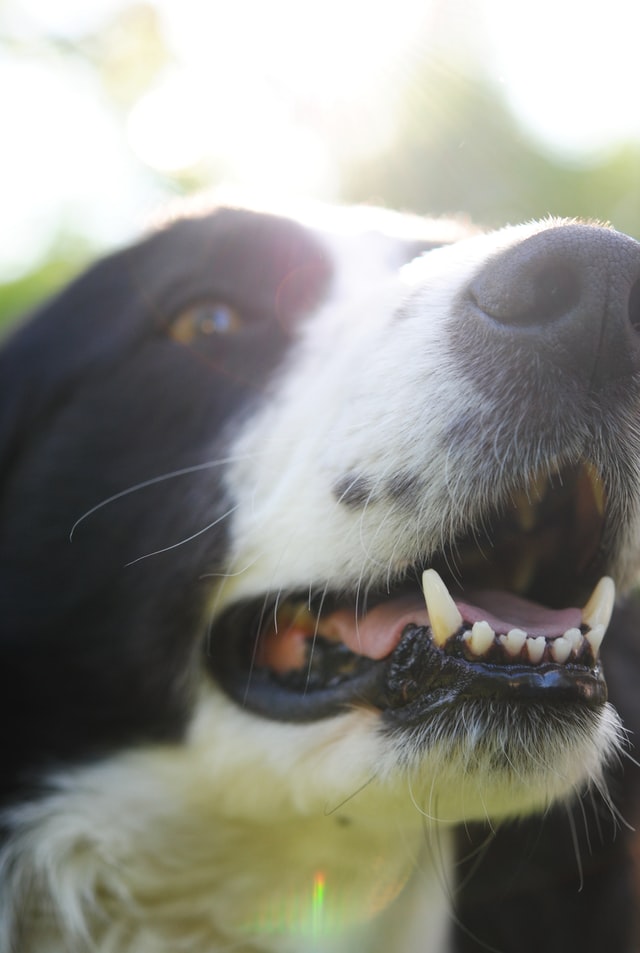
…skilled service…compassionate care
Healthy Teeth – Healthy Pet
Dental disease is important for overall oral health but also can affect other organs, especially kidneys and heart. Your pet’s regular veterinary check-up includes an examination of his teeth and gums. During the check-up, the doctor examines for tartar build-up, broken teeth, abscesses, and smells for bad breath, all signs of dental problems, as well as looking for oral growths.
By the age of three, the American Veterinary Medical Association (AVMA) tells us that 80% of dogs and 70% of cats will have some form of periodontal disease. You may not see it because periodontal disease also occurs below the gumline, so this stresses the importance of dental x-rays to visualize dental health below the gumline. Unfortunately, dental x-rays have to be done under general anesthesia. Bacteria can damage tissues connecting the teeth and jaw. Advanced periodontal disease doesn’t affect just the mouth; other problems such as kidney, liver, and heart muscle changes can occur.

Warning Signs of Possible Dental Disease
- Discolored teeth or teeth with tartar buildup
- Broken or loose teeth
- Bad breath
- Pain around the mouth
- Reduced appetite or refusal to eat
- Bleeding from the mouth
- Abnormal chewing
Causes of Pet Dental Problems
- Broken jaw
- Abscesses or infected teeth
- Cysts or tumors in the mouth
- Broken teeth and roots
- Cleft palate
Take this test to see how well you know your pet’s dental health. http://www.surveygizmo.com/s3/2511639/169767dabec4.
Support good pet dental health by brushing his teeth regularly – pet toothpaste, never use human paste – and by having your pet’s teeth checked regularly by your veterinarian. Start short brushing training and use treats to encourage pets to tolerate brushing. Start early before severe disease is present. Check out AVMA guidance on how to brush your pet’s teeth. https://www.youtube.com/embed/wB3GIAgrTPE. Our staff can help you if you have questions.
End of Life Plans
Saying goodbye to a beloved furry friend is never easy. Likewise, there are many stories about people concerned that their own passing may leave their wonderful pet alone. The national organization, Pet Peace of Mind was established to “preserve the bond of love and help hospice, home health organizations, and hospitals understand the importance of that bond in the lives of their patients.”
In our area, Muttville in San Francisco focuses on helping seniors – pets and people. They will connect a senior pet who may have lost its owner and/or senior people who are looking to share their lives with a wonderful pet.
If you face a life-changing event and are concerned about caring for pets who may be left behind, please consider contacting either of these agencies. Also, be sure you have specified your wishes for your pet in a will or other legal document.
Should I Spay or Neuter my Pet
The primary answer to that question is to help safeguard and impact your pet’s long-term health. More broadly, spaying and neutering pets prevent unwanted litters, which means fewer homeless pets in need. It seems obvious that spaying or neutering your pet is a great idea, but many people still resist.
The Humane Society of the United States reported on a study of over 70,000 that showed that the life expectancy of dogs and cats was significantly longer than unaltered animals. There are clearly behavioral benefits for neutering your pet, such as cats won’t yowl for mates and urinate all over the house. Dogs are less likely to roam and be injured by cars or other animals. They won’t be anxious to mark their territory and may be less aggressive.

Cons to neutering may be urinary incontinence that can develop in some dogs after surgery. Weight gain is another side effect but can be offset by adjusting calories to suit dogs/cats’ requirements. Some behavioral traits, i.e., aggression urine marking, if already ingrained, will not be eliminated by neutering.
Talk with your veterinarian to discuss when is the best time to neuter your pet, plus review the pros and cons of neutering. The choice to neuter will be based on breed, age, and overall health concerns. Your doctor will provide a post-surgical treatment plan, including wound care, activity level, and proper nutrition.
ROO’S NEWS!
by assistant editor, Roo, aka, Super Searcher With a Nose for News.
Dog Helps Police Save Owner After a Car Crash
At about 10 pm on January 3, the New Hampshire State Police received numerous calls of a dog running loose on the freeway. Responding officers arrived and attempted to coax the loose German Shepherd dog to them, but the dog stayed just out of reach yet did not run away. The officers followed the dog and noticed that the guardrail was damaged. They looked down where the dog was looking and saw a badly damaged truck with two people lying next to it on the ground.
When EMS arrived, they found two injured, slightly hypothermic occupants. Once EMS was on the scene, the dog, named Tinsley, lay down near the driver, her owner, and waited. Sadly, a second dog who had been riding in the truck was struck by a car and killed.

Lebanon, New Hampshire Deputy Chief Isham said the accident scene would not have been seen from a passing car, and Tinsley’s bravery and skill at luring the officers to the side of the road saved the people. Tinsley’s owner said her reward would be a big venison burger. I think she deserved it!
Keep Your Pets Well in Cold Weather
Pets may enjoy being outdoors, but fluctuating temperatures may cause concerns for their health. When temperatures change gradually, pets will develop thicker coats and adapt to the variations. That doesn’t happen with widely varying temperatures or if you travel to a cold area to vacation. Hot or cold weather, monitor your pet for changes that may affect their health and safety.
Your pet’s breed, age, medical condition, and fitness level all play a factor in his ability to withstand cold temperatures and for how long. For example, I love to play in the snow, but my friend and partner in crime, a Chihuahua, needs her sweater on even in the house. Here are a few tips to help your pet have fun with you in the cold weather.
When it is really cold and if your pet is unaccustomed to being in cold weather, a warm sweater will be welcome. Also, remember foot protection. Some dogs refuse to wear foot protection, so you must monitor the pads and especially areas between the toes for ice balls or cuts from ice. Use a good dog-appropriate foot salve to keep the pads from cracking. Wash the feet with warm water when you come inside, especially to remove any snow abatement chemicals. Remember, keep older pets comfortable. Pay attention to water consumption and give great nutrition that can be warmed before serving.
As always, check with your pet’s veterinarian for more tips or if you have any cold-weather concerns. Then, have fun in the outdoors.
Special December Holidays

National Pet Theft Awareness Day – February 14th
The American Kennel Club (AKC) reports that over 2,000,000 pets are stolen each year and only about 10% are returned. This is heartbreaking, but MetLife says there are things you can do to mitigate the chance that your beloved pet will be stolen:
- Microchip your pet – statistics indicate that 52% of missing microchipped pets are found.
- Spay or neuter your pet – this reduces your pet’s instinct to get loose and look for a mate
- Secure your fence – be sure your fence is intact and gates are latched and/or locked
- Maintain current photos of your pet – if your pet is lost or stolen, having a current photo will help when making posters
- Never tie your pet to a pole even for a minute to run into a store
Even if you do everything right, if your pet is taken, immediately notify local animal control and law enforcement. Notify local veterinarians and search internet sites for help.
Valentine’s Day – February 14th
A great day to show your loved ones how much you care for them. If you give extra treats to your furry friends, be sure you offer only pet-appropriate treats and never chocolate, high-fat treats/foods, or any item with xylitol. Lots of hugs and scratches are best.
National Cat Health Month
February is National Cat Health Month. Use this time to verify that your cat is current on vaccines, verify when the next wellness visit is scheduled, be sure your kitty is in overall great health. This should be purrrrrfect!


